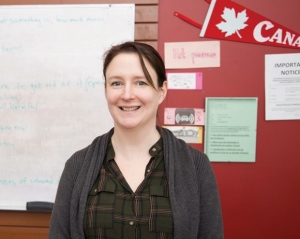While I haven’t exactly put my degree in sociology and Jewish studies credits to discipline-specific work, my enriching global experience helped shape me. Today, that great learning experience is passed along to my own students. I’ve never heard of a child telling his or her parents that they want to be an ESL teacher when they grow up. I know that my aspirations to be a cashier at the local grocery store made it a highly unlikely career prospect.
Before Concordia, I graduated from the theatre program at Dawson College in Montreal, with strong encouragement not to continue down that artistic road. The curtain closed before my career began. After CEGEP, I took a job at a diner and quickly discovered that food service wasn’t my cup of tea. I spent the next few years working in a pub, finding myself and fretting about my future.
After enrolling in various independent study courses, I spent 1995 to 2001 in wide-eyed amazement of Concordia professors who cultivated my patience, academic self-esteem and determination to finish my degree while doing my best.
My university studies were the most revelatory days of my 20s — I shudder to think where I’d be today without higher education and my professors. Yael Glick of the Department of Sociology and Anthropology taught me to have more self-confidence in my intellectual prowess, Frank Chalk from the Department of History inspired me to pay attention to precision, and late sociology professor Cary Boucock showed me how important it is to have passion for your work. I think of these three regularly. It is because of them that I teach with pride and gusto.
How I fell into ESL is literally a story for the pub. Upon my graduation from Concordia in 2001, I once again felt a surge of panic. I was 28, well-educated, yet had no real skills — unless you consider pouring the perfect pint of Guinness an asset on the world stage. I had been working at an Irish pub throughout my university days and a co-worker told me about some online classes she was giving to Europeans. My own teaching career began by giving telephone lessons. I loved it, because the learners on the other end of the phone were expressing the same anxiety about learning that I once voiced. I was able to make them relax, laugh and, in the process, improve their English without much heartache at all.
I then earned my TESOL (Teachers of English to Speakers of Other Languages) certification. I gradually made my way to giving corporate lessons and finally arrived at the Montreal International Institute for Language Arts (MIILA). At MIILA, I teach teenagers and adults from all over the world to understand, speak, write and feel comfortable with the English language.
Many of my students come to the school feeling much like I did at Concordia. They are fish out of water, unsure they can succeed, fearful of defeats and public failure. (OK, that last one was my own fear.)
I know exactly how intimidating education can be when you don’t believe in yourself. Concordia taught me to realize that I am just as qualified to succeed as anyone else. My university experience showed me that encouragement, effort, perseverance and support are critical ingredients in meeting my life objectives.
I keep in touch with many of my ESL students once they return to their countries. I’m greatly validated by their good memories. Gratitude never stops from them. Nothing says you’ve done a great job more than “Thank you so much!” I don’t think I’d be a very compassionate teacher if I hadn’t lived through terror — terror of discovering I could realize my ambitions with the help of my professors.
Thank you, Concordia!
Related links

 Elizabeth Darlington teaches English as a second language at the Montreal International Institute for Language Arts.
Elizabeth Darlington teaches English as a second language at the Montreal International Institute for Language Arts.